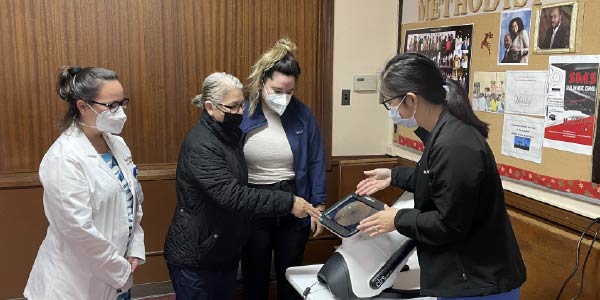

UCSD ophthalmology faculty, fellows, and residents are engaged in a wide range of public health and community service activities. Many of our residents are passionate about service and public health, and are able to continue their involvement while engaged in residency training.
Examples Include:
The UCSD Student Run Free Clinic

The UCSD Student Run Free Clinic provides healthcare for underserved patients in San Diego while inspiring the next generation of health professionals. The clinic provides primary care services as well as subspecialty clinic services.
There are ophthalmology specialty clinics available at the Downtown, Pacific Beach, and Normal Heights locations. At these clinics, ophthalmology residents and fellows can assist in providing care to underserved patients who would otherwise not have access to medical care. This is also a medical education opportunity, given that residents and fellows are involved in teaching medical students who are learning basic ophthalmology examination skills during these clinics as well.
Faculty physicians who have volunteered with the free clinic include Jeffrey Lee, MD, Andrew Camp, MD, Derek Welsbie, MD, PhD, Jiun Do, MD, PhD, Jolene Rudell, MD, PhD, and Sally Baxter, MD.
Division of Community Ophthalmology

The UCSD Division of Community Ophthalmology conducts population health initiatives such as performing vision screenings for preschool and elementary school children across San Diego County, including in underserved areas, through the EyeMobile for Children. In continuous operation since 1999, the EyeMobile has conducted over 240,000 vision screenings and provided free glasses to over 13,000 children.
The Division is also active in conducting community-based research and clinical trials. There are opportunities for trainee involvement, and the Division of Community Ophthalmology has a strong tradition of providing engagement opportunities for a wide spectrum of trainees, from undergraduates to ophthalmology residents.
UCSD Health has a charity care program in place to facilitate care for uninsured individuals, including for ophthalmic services. Many of our faculty make substantial efforts to make advanced eye care accessible to uninsured individuals through this program.
Residents have opportunities to assist in the care of these patients and learn not only the clinical aspects of their management, but also receive firsthand experience in understanding social determinants of health and how to navigate systems to procure coverage for services in uninsured populations.
UCSD Health has a charity care program in place to facilitate care for uninsured individuals, including for ophthalmic services. Many of our faculty make substantial efforts to make advanced eye care accessible to uninsured individuals through this program.
Residents have opportunities to assist in the care of these patients and learn not only the clinical aspects of their management, but also receive firsthand experience in understanding social determinants of health and how to navigate systems to procure coverage for services in uninsured populations.
Rady Children’s Hospital-San Diego has a partnership with the Fresh Start Surgical Gifts charity to provide reconstructive surgery and other medical services at the Fresh Start Clinic at Rady Children’s by a volunteer team of surgeons and medical professionals to underserved children.
Shiley faculty, including Don Kikkawa, MD, have participated in this program and have included interested housestaff in participating in these reconstructive surgeries, which address physical deformities in children caused by birth defects, accidents, abuse or disease.
The GOAL program is a structured training program that integrates preventive medicine training alongside ophthalmology residency training. Research and public health competencies are developed in community-based ophthalmology, clinical preventive medicine, global health initiatives, and working with underserved communities.
Residents will have the opportunity to complete an MPH degree as well as be board-eligible for certification in Preventive Medicine (in addition to board eligibility in Ophthalmology) upon completion of the 5-year program. More details are available here.